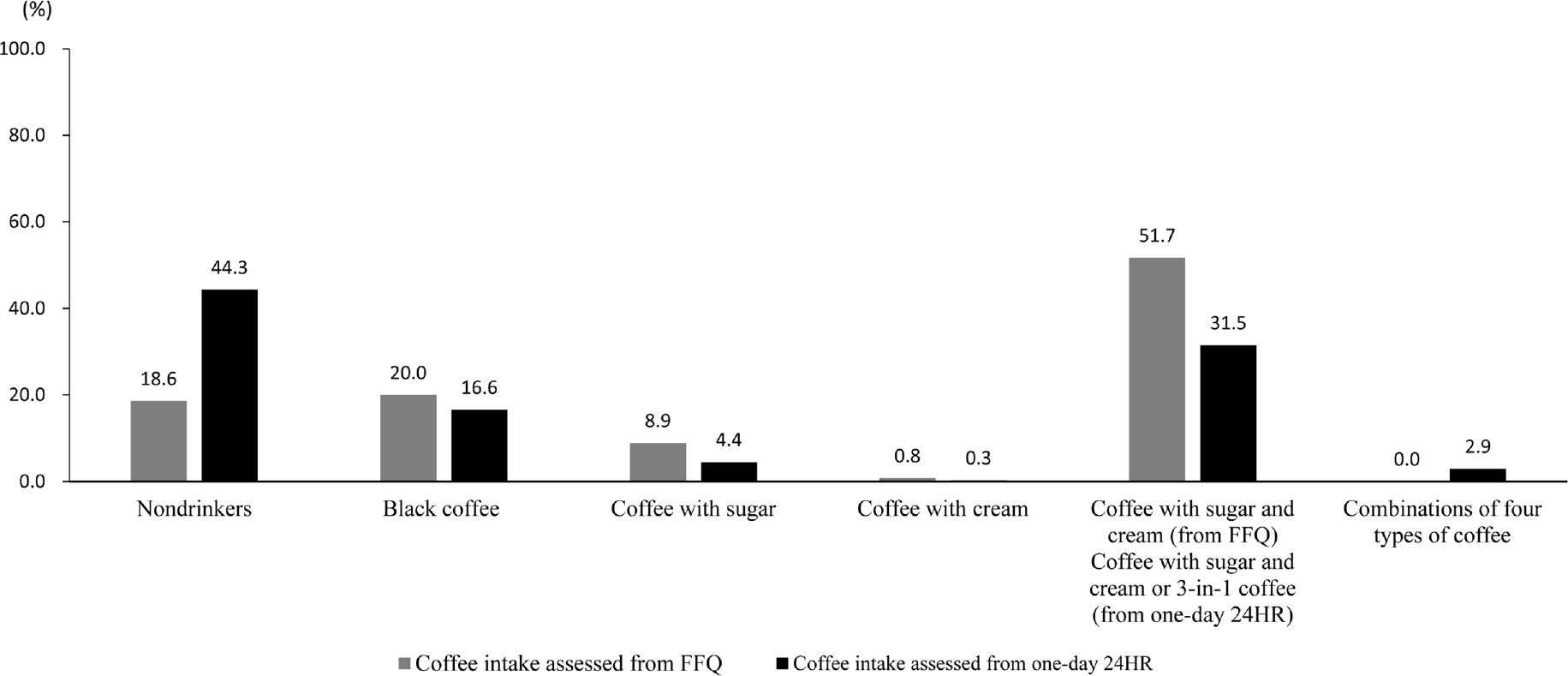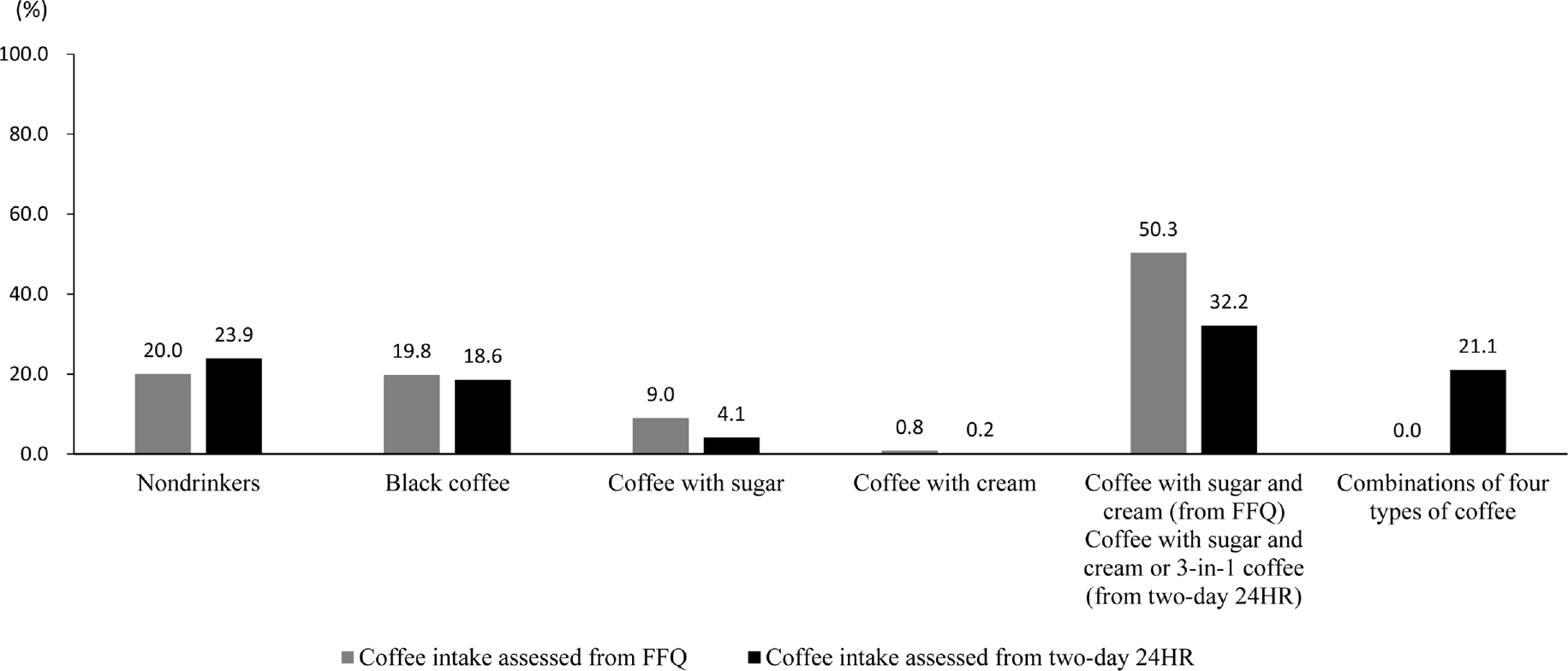Korean J Community Nutr.
2020 Feb;25(1):48-60. 10.5720/kjcn.2020.25.1.48.
Comparison of 24-hour Recalls with a Food Frequency Questionnaire in Assessing Coffee Consumption: The Health Examinees (HEXA) Study
- Affiliations
-
- 1Department of Food and Nutrition, College of Human Ecology, Seoul National University, Seoul, Korea, Student.
- 2Department of Food and Nutrition, Chung-Ang University, Gyeonggi-do, Korea, Professor.
- 3Department of Food and Nutrition, College of Human Ecology, Seoul National University, Seoul, Korea, Professor. jungelee@snu.ac.kr
- 4The Research Institute of Human Ecology, Seoul National University, Seoul, Korea, Professor.
- KMID: 2471307
- DOI: http://doi.org/10.5720/kjcn.2020.25.1.48
Abstract
OBJECTIVES
Most cohort studies used food frequency questionnaires (FFQ) to evaluate coffee consumption as it assesses habitual dietary patterns, whereas some studies have used the 24-hour recalls (24HR) as it elicits in-depth description of foods and the amount eaten. The aim of this study was to compare FFQs and 24HR to assess the consumption of various types of coffee.
METHODS
We included 25,904 participants aged 40 years or older from the Health Examinees (HEXA) Study of the Korean Genome and Epidemiologic Study (KoGES). Each participant completed one FFQ and one-day (n=11,280) or two-day 24HR (n=14,624). We classified coffee types into: black coffee, coffee with sugar and cream, and coffee with sugar alone or cream alone. We compared the proportions of nondrinkers, black coffee, and coffee with sugar and cream through FFQ and 24HR.
RESULTS
Among those who completed one FFQ and one-day 24HR, 39.4% of "nondrinkers" on one-day 24HR reported that they did not drink coffee on their FFQs. Whereas among those who complete two-day 24HR, 71.2% of "nondrinkers" on two-day 24HR said that they did not drink coffee on their FFQs. Among those who completed one FFQ and oneday 24HR, 58.3% marked "black coffee" on one-day 24HR said that they drank black coffee on their FFQs. Among those who complete two-day 24HR, 58.8% marked "black coffee" on two-day 24HR said that they drank black coffee on their FFQs. The kappa coefficients and percent agreements were 0.4 and 59.6%, respectively, for the comparison of coffee intake between FFQ and one-day 24HR, and 0.6 and 72.8%, respectively, for the comparison of coffee intake between FFQ and two-day 24HR.
CONCLUSIONS
We found discrepancies between FFQs and 24HR in the types of coffee consumed. Such limitations should be considered when using the 24HR data to examine the effect of coffee consumption on disease development.
Keyword
Figure
Reference
-
References
1. Je Y, Jeong S, Park T. Coffee consumption patterns in Korean adults: the Korean National Health and Nutrition Examination Survey (2001–2011). Asia Pac J Clin Nutr. 2014; 23(4):691–702.2. Ding M, Bhupathiraju SN, Chen M, van Dam RM, Hu FB. Caffeinated and decaffeinated coffee consumption and risk of type 2 diabetes: A systematic review and a dose-response metaanalysis. Diabetes Care. 2014; 37(2):569–586.
Article3. Ding M, Bhupathiraju SN, Satija A, van Dam RM, Hu FB. Long-term coffee consumption and risk of cardiovascular disease: a systematic review and a dose-response metaanalysis of prospective cohort studies. Circulation. 2014; 129(6):643–659.4. Yu X, Bao Z, Zou J, Dong J. Coffee consumption and risk of cancers: a metaanalysis of cohort studies. BMC Cancer. 2011; 11(1):96.
Article5. Willett W. Food frequency methods, in nutritional epidemiology. New York: Oxford University Press;2013. p. 70–89.6. Willett W. 24 Hour recall and diet record methods, in nutritional epidemiology. New York: Oxford University Press;2013. p. 49–69.7. Kim HJ, Cho S, Jacobs DR, Park K. Instant coffee consumption may be associated with higher risk of metabolic syndrome in Korean adults. Diabetes Res Clin Pract. 2014; 106(1):145–153.
Article8. Lee JH, Oh MK, Lim JT, Kim HG, Lee WJ. Effect of coffee consumption on the progression of type 2 diabetes mellitus among prediabetic individuals. Korean J Fam Med. 2016; 37(1):7–13.
Article9. Kim H, Kim YJ, Lim Y, Kwon O. Association of coffee consumption with health-related quality of life and metabolic syndrome in Korean adults: based on 2013∼2016 Korea National Health and Nutrition Examination Survey. J Nutr Health. 2018; 51(6):538–555.10. Yeon JY, Bae YJ. 3-in-1 coffee consumption is associated with metabolic factors in adults: Based on 2012∼2015 Korea National Health and Nutrition Examination Survey. J Nutr Health. 2017; 50(3):257–269.
Article11. Kim EK, Choe JS. Correlation of nutrient intake, obesity-related anthropometrics, and blood lipid status with instant coffee-mix intakes in Gangneung and Samcheok residents. Korean J Community Nutr. 2013; 18(2):134–141.
Article12. Kipnis V, Subar AF, Midthune D, Freedman LS, Ballard-Barbash R, Troiano RP, et al. Structure of dietary measurement error: Results of the OPEN biomarker study. Am J Epidemiol. 2003; 158(1):14–21.
Article13. Schatzkin A, Kipnis V, Carroll RJ, Midthune D, Subar AF, Bingham S, et al. A comparison of a food frequency questionnaire with a 24-hour recall for use in an epidemiological cohort study: results from the biomarker-based Observing Protein and Energy Nutrition (OPEN) study. Int J Epidemiol. 2003; 32(6):1054–1062.
Article14. Kim Y, Han BG, KoGES Group. Cohort profile: The Korean Genome and Epidemiology Study (KoGES) consortium. Int J Epidemiol. 2017; 46(2):e20.15. Health Examinees Study Group. The Health Examinees (HEXA) study: rationale, study design and baseline characteristics. Asian Pac J Cancer Prev. 2015; 16(4):1591–1597.16. World Health Organization. The Asia-Pacific perspective: redefining obesity and its treatment. Sydney: Health Communications Australia;2000.17. Ahn Y, Kwon E, Shim JE, Park MK, Joo Y, Kim K, et al. Validation and reproducibility of food frequency questionnaire for Korean genome epidemiologic study. Eur J Clin Nutr. 2007; 61(12):1435–1441.
Article18. Hebert JR, Miller DR. Methodologic considerations for investigating the diet-cancer link. Am J Clin Nutr. 1988; 47(6):1068–1077.
Article19. Willett W. Nature of variation in diet in nutritional epidemiology. New York: Oxford University Press;2013. p. 34–48.
- Full Text Links
- Actions
-
Cited
- CITED
-
- Close
- Share
- Similar articles
-
- Estimation of the Usual Food Intake Distribution Reflecting the Consumption Frequency and a Comparison of the Proportion of Non-consumers: Based on the KNHANES 2009
- Dairy product consumption and type 2 diabetes among Korean adults: a prospective cohort study based on the Health Examinees (HEXA) study
- Correlation of Coffee Consumption, Lifestyle, and Nutrient Density
- Association of coffee consumption with health-related quality of life and metabolic syndrome in Korean adults: based on 2013 ~ 2016 Korea National Health and Nutrition Examination Survey
- Comparison of Frequency and Amount of Dishes Reported in Semi-Quantitative Dish-based Frequency Questionnaire vs. 12-day Dietary Records



